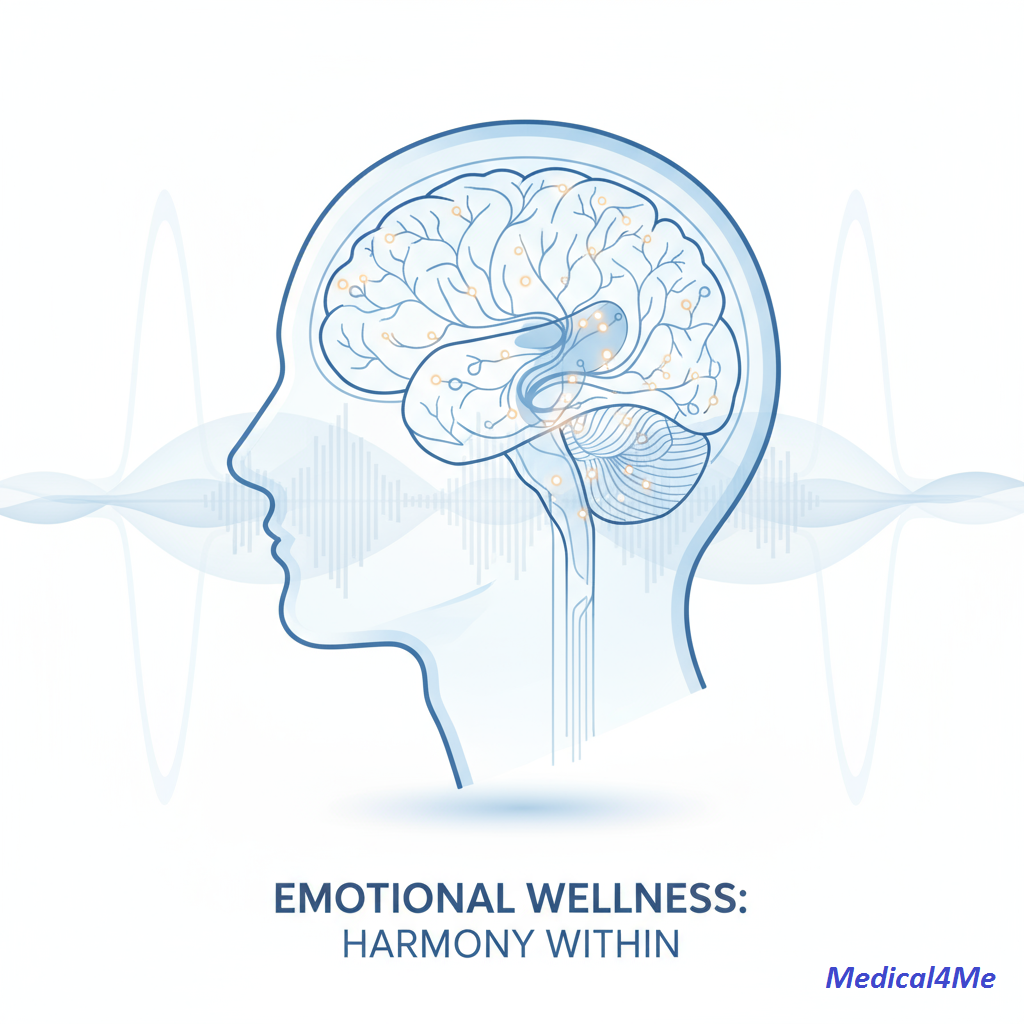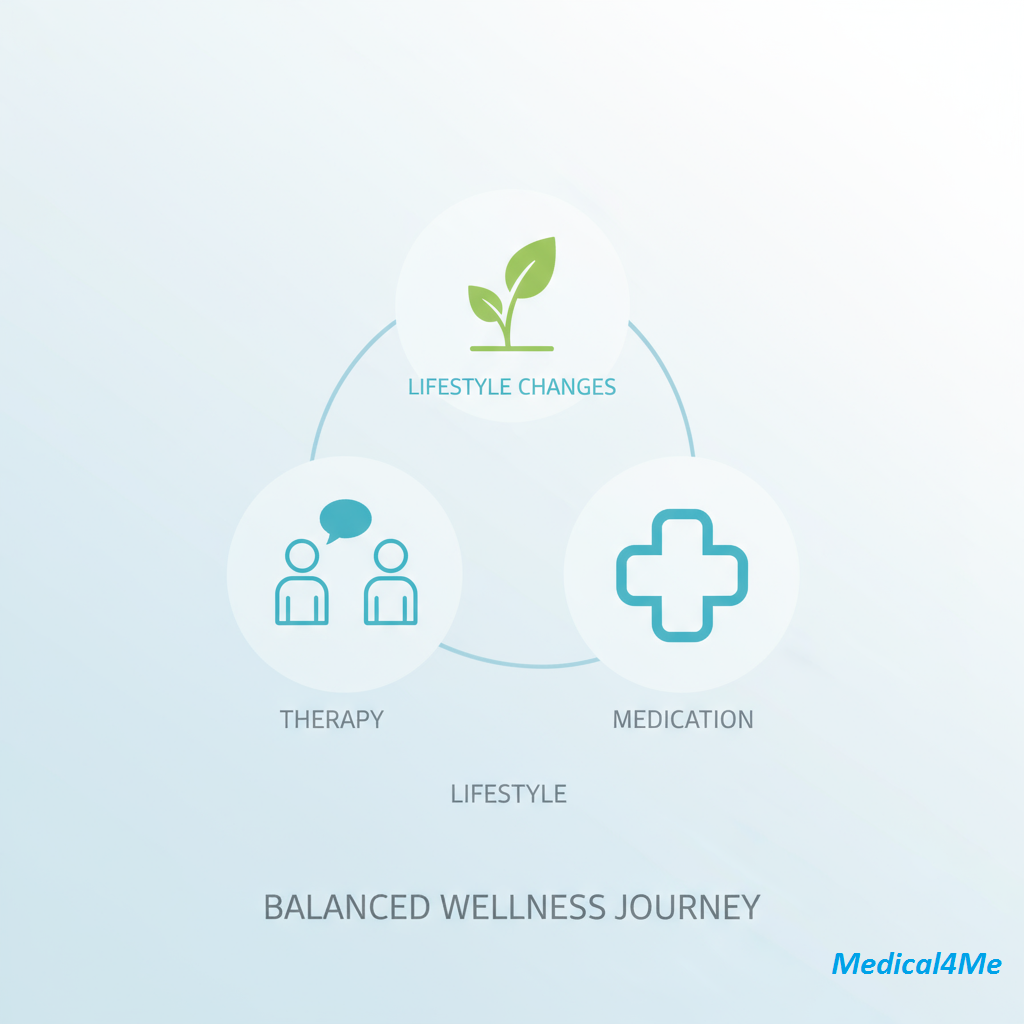Understanding Anxiety Disorders: A Doctor’s Real Experience
Okay, so Anxiety Disorders… where do I even start?
Look, I’m sitting here with my third cup of tea and my brain is absolutely fried. Had this patient Mariam, 38 years old, came in around lunch still in her work clothes looking completely panicked because she’d been having these episodes for weeks and thought she was dying. The thing is, that’s how Anxiety Disorders present half the time – people genuinely believe something catastrophic is happening to their heart or their brain when actually it’s their mind essentially misfiring danger signals. I see this literally every single day and websites make it sound so clinical and detached but when you’re the one experiencing it? Absolutely terrifying.
Actually, let me back up.
You asked about Anxiety Disorders and honestly, there’s so much misinformation out there it drives me crazy. So let me explain this properly, or as properly as I can manage right now.

Understanding Anxiety Disorders – Let Me Explain
The thing is, everyone gets anxious sometimes. That’s normal. That’s your brain doing exactly what evolution designed it to do – keeping you alert to danger.
Anxiety Disorders are different though. They’re when that alarm system gets stuck in the “on” position. Your brain starts screaming danger when you’re just sitting at your desk, or trying to sleep, or literally doing nothing threatening at all. Furthermore, it’s not just mental – your whole body responds like there’s an actual threat. Heart racing, sweating, can’t breathe properly, the works.
I had Tariq come in at 3:47 PM exactly today – I remember because I was supposed to leave early for once – and he’s 67, brought his daughter with him because he was convinced he’d had multiple heart attacks over the past month. We ran tests. Heart’s fine. Perfect, actually, for his age. But he’d been having panic attacks, which are part of the Anxiety Disorders spectrum, and nobody had explained to him that panic attacks genuinely feel like you’re dying. The chest pain is real. The shortness of breath is real. But it’s not your heart failing – it’s anxiety.
There are several types under the Anxiety Disorders umbrella. Generalized Anxiety Disorder, or GAD, where you’re basically worried about everything all the time. Social Anxiety Disorder, which isn’t just being shy – it’s debilitating fear of social situations. Panic Disorder, which is what I think Tariq has. Specific phobias. And others.
Here’s what happened – I spent twenty minutes explaining to him that his brain and body were both healthy, just communicating wrong. His daughter was taking notes on her phone. Meanwhile the waiting room was still full and I could hear my receptionist dealing with someone else who’d just walked in without an appointment.
The Basics Nobody Explains Right
So here’s the thing websites don’t tell you clearly enough.
Anxiety Disorders aren’t just “feeling worried.” If it was that simple, we’d all just tell people to relax and problem solved, right? Actually, these are legitimate medical conditions involving neurotransmitters – chemicals in your brain like serotonin, norepinephrine, GABA. When these get imbalanced, your threat detection system malfunctions.
I mean, think of it like a smoke alarm that goes off when you’re making toast. The alarm works fine. Toast isn’t fire. But the sensitivity is all wrong. Your brain’s doing that with normal life situations.
Plus, and this annoys me when I see it online, people act like you can just “think positive” and cure Anxiety Disorders. Look, positive thinking might help a bit, but telling someone with GAD to just stop worrying is like telling someone with a broken leg to just walk normally. It’s not how this works.
Why It’s Different From What You Think
Honestly, most people think Anxiety Disorders mean you’re weak or overreacting.
Wrong. Completely wrong. These are neurobiological conditions. Actually, some of the strongest people I know have Anxiety Disorders – they’re just fighting an invisible battle every single day while trying to appear normal to everyone around them.
The WHO data shows that Anxiety Disorders are among the most common mental health conditions globally. We’re talking hundreds of millions of people. So if you have one, you’re definitely not alone, though I know it feels isolating.
Oh and another thing – Anxiety Disorders aren’t the same as stress. Stress is a response to external pressure. Anxiety Disorders can happen when there’s literally nothing stressful happening. That’s what makes them so confusing for people experiencing them. You’re anxious and you can’t even point to why.
The Symptoms – What You’ll Actually Feel
Right, so symptoms. This is where it gets messy because Anxiety Disorders manifest differently in everyone.
Early Signs People Miss
The early stuff is subtle. That’s the problem.
You might notice you’re worrying more than usual. Not about anything specific necessarily – just this vague sense of dread. However, everyone worries sometimes, so you brush it off. You’re sleeping worse. Maybe your stomach’s upset more often. Muscle tension, especially in your neck and shoulders. Honestly, most people attribute these to stress or being tired or getting older.
Sana came in right before closing today, 29 years old, clutching these printed Google results that had convinced her she had about seventeen different diseases. She’d been experiencing fatigue, difficulty concentrating, irritability – all early Anxiety Disorders symptoms – for months. But she thought she had chronic fatigue syndrome, or maybe thyroid problems, or possibly early onset dementia. The thing is, anxiety was the last thing she suspected because she didn’t “feel anxious” in the traditional sense.
That’s what I’m saying – early Anxiety Disorders don’t always feel like fear. Sometimes it’s just feeling off. Restless. On edge. Like something’s wrong but you can’t identify what.
Did I mention the physical symptoms? The physical symptoms often come first, before you even register feeling anxious mentally.
When Things Get Serious
Okay, so when Anxiety Disorders progress – and they will if untreated – things escalate.
Full panic attacks. And I mean the works: heart pounding so hard you think it’ll burst out of your chest, hyperventilating, dizziness, numbness in your hands and feet, feeling detached from reality. Some people describe it as feeling like they’re watching themselves from outside their body. Terrifying stuff. Actually, panic attacks peak around 10 minutes usually, but those 10 minutes feel like hours.
You start avoiding things. Social Anxiety Disorder makes you cancel plans. GAD makes you avoid anything that triggers worry – which eventually becomes everything. Agoraphobia can develop, where you’re afraid to leave your house or safe spaces.
The Mayo Clinic explains how chronic anxiety affects your whole body over time. We’re talking increased blood pressure, weakened immune system, digestive issues, chronic pain. Your body can’t sustain high-alert status indefinitely without consequences.
Furthermore, Anxiety Disorders often bring friends – depression, substance abuse issues, other mental health conditions. It’s rare to see pure, uncomplicated anxiety in my clinic. Usually it’s anxiety plus something else.
Why This Happens to People
So why do Anxiety Disorders develop? Where was I… right, causes.
Your Body’s Role
There’s definitely a genetic component. If your parents or siblings have Anxiety Disorders, you’re more likely to develop them too. Not guaranteed, but the risk is higher.
Brain chemistry matters. Those neurotransmitters I mentioned – serotonin, GABA, dopamine, norepinephrine – when these are out of balance, Anxiety Disorders can develop. Some people are just born with different baseline levels. The thing is, we can’t just measure your brain chemicals with a simple blood test, which would make my job so much easier.
Your brain structure plays a role too. The amygdala – that’s your fear center – can be overactive in people with Anxiety Disorders. Meanwhile, the prefrontal cortex, which should regulate the amygdala and provide rational thinking, might not be doing its job effectively.
Actually, medical conditions can cause or worsen anxiety too. Thyroid problems, heart arrhythmias, diabetes, respiratory issues. That’s why diagnosis requires ruling out physical causes, which I’ll get to in a bit.
External Factors
However, it’s not just biology.
Trauma is huge. Childhood trauma especially. Abuse, neglect, witnessing violence, losing a parent – these experiences literally rewire your threat detection system. Your brain learns the world is dangerous, and that learning sticks. Look, I’ve seen patients who had objectively terrible childhoods and don’t have Anxiety Disorders, and others with seemingly normal upbringings who develop severe anxiety. There’s no perfect formula.
Chronic stress accumulates. One stressful event? Most people handle it. But months or years of stress – difficult job, relationship problems, financial strain, caregiving responsibilities – that wears down your resilience. Eventually your nervous system can’t recalibrate to baseline anymore.
Substance use matters too. Caffeine, alcohol, drugs – all of these mess with your brain chemistry and can trigger or worsen Anxiety Disorders. Plus, people often self-medicate anxiety with alcohol, which works short-term but makes everything worse long-term. It’s a trap.
Oh and personality factors. Perfectionists, people-pleasers, highly sensitive people – not that these traits cause Anxiety Disorders exactly, but they seem to create vulnerability.
Getting Diagnosed – The Real Process
Alright, so how do we actually diagnose Anxiety Disorders?
What Happens at Your Appointment
First, you need to actually come see a doctor. That’s step one, which surprisingly lots of people avoid because they’re embarrassed or think they should be able to handle it themselves.
When you come to someone like me, I’m going to ask a lot of questions. What symptoms are you experiencing? When did they start? How often do they happen? How severe are they? What triggers them, if anything? How are they affecting your daily life – work, relationships, sleep, eating?
I’m also taking a full medical history. Other health conditions? Medications? Family history of mental health issues? Any recent major life changes or stressors? Substance use? The thing is, I need the full picture, not just “I feel anxious.”
Honestly, this part takes time. I can’t diagnose Anxiety Disorders in a five-minute consultation. I had to spend almost forty minutes with Mariam today going through everything because initially she just said she was having “stress problems” and only through careful questioning did the full panic disorder presentation emerge.
There are standardized questionnaires we use too. GAD-7 for generalized anxiety, screening tools for panic disorder, social anxiety scales. These help quantify severity and track progress over time.
Tests They’ll Run
Here’s the thing though – there’s no blood test for Anxiety Disorders. No brain scan that shows “anxiety present.” The diagnosis is clinical, based on your symptoms and history.
However, I absolutely run tests to rule out other conditions. Thyroid function tests, because hyperthyroidism mimics anxiety perfectly. Basic metabolic panel. Complete blood count. Maybe an ECG if you’re having chest pain or palpitations, because I need to make sure it’s actually anxiety and not a heart problem.
Sometimes I order more specialized tests depending on symptoms. Vitamin deficiencies can cause anxiety-like symptoms. Hormonal imbalances. Sleep studies if insomnia is prominent.
The CDC guidelines state that proper diagnosis requires meeting specific criteria from the DSM-5 – that’s the diagnostic manual we use. For GAD, you need excessive anxiety and worry for at least 6 months, difficulty controlling the worry, and at least three of six specific symptoms. Each Anxiety Disorder has its own criteria.
Wait, I already explained the types earlier, didn’t I?
Treatment – What Actually Works
Okay, so treatment. This is what everyone actually wants to know.
Natural Approaches First
Look, I always start with lifestyle modifications when appropriate. Not because they’re definitely sufficient – often they’re not – but because they help regardless and have zero side effects.
Exercise is huge. Actually, regular aerobic exercise is as effective as medication for mild to moderate Anxiety Disorders according to multiple studies. It burns off stress hormones, increases endorphins, improves sleep. I recommend 30 minutes most days of the week. Doesn’t have to be intense – walking counts.
Sleep hygiene. Anxiety destroys sleep, poor sleep worsens anxiety. Vicious cycle. So: consistent sleep schedule, cool dark quiet bedroom, no screens an hour before bed, limit caffeine especially after noon. Basic stuff but people don’t do it.
Dietary changes can help. Reduce caffeine and alcohol significantly. Eat regularly to avoid blood sugar crashes which can trigger anxiety. Some people benefit from reducing sugar and processed foods. Oh and stay hydrated – dehydration can cause symptoms that mimic anxiety.
Therapy is not exactly “natural” but it’s non-medication treatment, so I’m putting it here. Cognitive Behavioral Therapy – CBT – is the gold standard for Anxiety Disorders. It teaches you to identify and change thought patterns that fuel anxiety. Furthermore, exposure therapy for specific phobias and social anxiety works incredibly well. You gradually face feared situations in a controlled way until your brain learns they’re not actually dangerous.
Actually, therapy takes work. It’s not passive like taking a pill. You have to practice techniques, face uncomfortable situations, challenge your thinking. But the results last because you’re actually retraining your brain. Medications work while you take them; therapy skills stick around.
Relaxation techniques: deep breathing, progressive muscle relaxation, meditation, yoga. Honestly, these help but they’re not going to cure moderate to severe Anxiety Disorders on their own. They’re tools in the toolkit, not the whole solution.

Medical Options
Sometimes you need medication. That’s just reality.
SSRIs – selective serotonin reuptake inhibitors – are usually first-line. Medications like sertraline, escitalopram, fluoxetine. These increase serotonin in your brain, which helps regulate mood and anxiety. The thing is, they take 3-4 weeks to work. Actually more like 4-6 weeks realistically to see full effects. So you need patience.
SNRIs like venlafaxine are another option, working on both serotonin and norepinephrine. Similar timeline, similar effectiveness. Plus, both SSRIs and SNRIs help with depression too, which is relevant since Anxiety Disorders and depression often occur together.
Benzodiazepines – lorazepam, alprazolam, diazepam – work fast. Like within 30 minutes. That’s the appeal. However, they’re addictive, cause dependence, have withdrawal issues, and are really only appropriate for short-term use or acute panic attacks. I’m very cautious prescribing these despite patients often requesting them specifically.
Buspirone is an anti-anxiety medication that’s not addictive but takes a few weeks to work. It’s less effective than SSRIs in my experience but works for some people.
Beta-blockers like propranolol can help with physical anxiety symptoms – the racing heart, shaking, sweating. They’re especially useful for performance anxiety. Actually, I have several patients who take propranolol before presentations or social situations.
Did I mention the timeline? Wait, I did. The timeline is usually several weeks before you notice improvement with most anxiety medications.
Side effects happen. Nausea, headaches, sexual side effects, weight changes, drowsiness or insomnia depending on the medication. Most side effects improve after the first couple weeks. If they don’t, we try a different medication. There are lots of options.
When to Panic (And When Not To)
So when is anxiety actually an emergency versus just really uncomfortable?
If you’re having suicidal thoughts, that’s an emergency. Get help immediately. Anxiety Disorders increase suicide risk, especially when combined with depression, and this is serious. Actually, call emergency services or go to an ER. Don’t wait.
If you can’t function – can’t go to work, can’t take care of yourself or your family, can’t leave your house – you need help urgently. Not necessarily emergency room urgently, but you need to see a mental health professional as soon as possible. Like with other conditions, early intervention matters.
Panic attacks feel like emergencies but usually aren’t. I know that’s not comforting when you’re having one and genuinely think you’re dying. The first panic attack? Yeah, go to the ER, make sure it’s not your heart. But once Anxiety Disorders are diagnosed and you know what panic attacks feel like for you, you can usually ride them out. They peak and then decrease. They won’t actually kill you, even though they feel like they might.
However, if you’re having new or different symptoms – like chest pain that radiates to your arm, or you’re coughing up blood, or you have a severe headache unlike any you’ve had before – don’t assume it’s anxiety. Get checked out. Sometimes real medical emergencies happen to people with Anxiety Disorders too.
Look, if you’ve been anxious for weeks or months and it’s affecting your quality of life, you don’t need to panic but you shouldn’t just suffer through it either. Make an appointment. Get evaluated. Treatment works.
Questions Everyone Asks Me
Let me think… what do people always ask about Anxiety Disorders?
“Will I have to take medication forever?” Maybe, maybe not. Some people need long-term medication. Others take it for 6-12 months while doing therapy, then taper off successfully. There’s no single answer. Furthermore, there’s no shame in long-term medication if that’s what keeps you functional and feeling well. Like, we don’t judge diabetics for taking insulin indefinitely. Mental health conditions aren’t different.
“Can anxiety kill you?” Directly? No. The panic attack itself won’t stop your heart. However, chronic untreated Anxiety Disorders increase your risk of heart disease, high blood pressure, and other physical health problems over time. So indirectly, yes, it affects your overall health and longevity. Plus the suicide risk I mentioned.
“Is this all in my head?” God, this one frustrates me. Yes, it’s in your head – in your brain, which is an organ that can malfunction like any other organ. That doesn’t make it less real. Your brain is part of your body. Brain conditions are medical conditions. The suffering is real, the symptoms are real, the disability is real.
“What if therapy doesn’t work?” Then we try different therapy approaches, add medication, adjust the medication, refer to a specialist. There are many treatment options for Anxiety Disorders. The first thing we try doesn’t always work, but something usually does if you stick with the process.
“Will people think I’m crazy?” Honestly, who cares what people think? Also, Anxiety Disorders are incredibly common. Maybe don’t announce it to your whole office if you’re not comfortable, but the stigma is decreasing. More people are open about mental health now than ever before. Oh and “crazy” isn’t a medical term and doesn’t apply to Anxiety Disorders anyway.
I mentioned in recent posts that mental health treatment has improved massively in the past couple decades. We have better medications with fewer side effects, better understanding of therapy techniques, more awareness and resources. It’s a much better time to have Anxiety Disorders than it was 30 years ago, if there’s ever a good time.
What I Tell All My Patients
Here’s what I say to everyone who comes to me with Anxiety Disorders, and what I’m telling you now because you called worried.
Anxiety Disorders are treatable. Like, genuinely, truly treatable. Most people improve significantly with proper treatment. You don’t have to feel this way forever.
Treatment works best when you’re consistent. Take medication as prescribed, go to therapy appointments, practice the techniques you learn. Don’t just stop medication when you feel better – talk to your doctor about tapering. Don’t skip therapy because you had a good week.
Be patient with the process. You didn’t develop Anxiety Disorders overnight and you won’t cure them overnight either. We’re talking weeks to months to see real improvement, and that’s normal. Actually, that’s expected.
You’re not weak. You’re not broken. Your brain is having a problem, and brains can be helped. Here at Medical4Me, we see people with Anxiety Disorders every single day and help them get better every single day. This is fixable.
Look, if you’re having panic attacks, persistent worry that’s affecting your life, physical symptoms you can’t explain, avoidance of situations, just see your doctor. Don’t panic, but don’t wait months either thinking it’ll go away on its own. Sometimes it does, but usually it gets worse without treatment. That’s really all there is to it.
Sorry this was all over the place. Long day. But you get the idea, right?


💬 Share Your Experience
Share your thoughts, questions, or personal tips below. Our community and editorial team value respectful and insightful discussions.